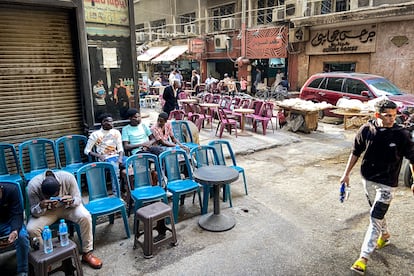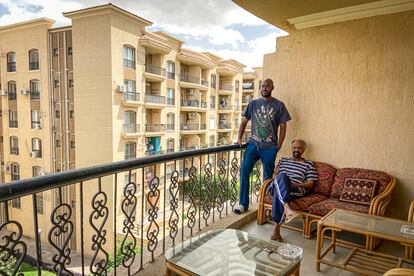Concerns about fleeing Sudanese are increasing, including among their compatriots in Egypt
Of the more than 200,000 Sudanese who have fled violence in their country, almost half went to Egypt where millions already live, leading to heightened tension

The eight-member Osman family had barely stepped off the train when Bakry Ahmed bombarded them with questions. Does the family come from Sudan, the hefty man with a gray and white checkered blouse want to know? Yes, he suspected that. Do they already have a place to stay, transportation? The bespectacled Abu Osman, an older man dressed in a red T-shirt, is the point of contact as head of the family. He listens suspiciously to Ahmed’s barrage of questions — they don’t need any help, he says, slightly irritatably. But Ahmed can’t hear him anymore: he’s already on his way to the exit of Cairo’s central station, carrying one of the Osmans’ suitcases on his shoulders.
The family, like more than 350,000 other Sudanese, has fled the ongoing fighting between the Sudanese Army and the paramilitary Rapid Support Forces (RSF) in their homeland. That conflict started four weeks ago when the commanders of both armies could not agree on power-sharing. Although delegates from the two sides are holding “exploratory talks” to reach a truce, fierce fighting is still raging in several places across the country. The Osman family therefore traveled for days from the capital, Khartoum, to the border with Egypt, taking the slow train to Cairo from the southern city of Aswan.
The energetic Ahmed guides the tired family members to the cabs parked at Ramsisplein. Only when everyone has crammed into two very old vehicles and the cars are about to leave for their temporary residence does their mistrust of Ahmed seem to come to an end. Is he not coming, Abu Osman’s wife asks? He doesn’t even need money? “Praise be to Allah,” she laughs with relief. From the rolled-down window she continues to thank Ahmed, until the cars merge into the chaotic traffic of the Egyptian capital.

“We must help each other”
“It’s nothing more than takaful, solidarity,” says Ahmed with satisfaction as he sips a glass of very sweet tea a little later in Adly, a neighborhood in the center of Cairo where many Sudanese live. “We are brothers and sisters, we have to help each other.” There is a Sudanese hairdresser nearby and groups of Sudanese men are sitting on the terraces of coffee shops, smoking and watching a football match.
An estimated nine million migrants and refugees live in Egypt, of whom no fewer than four million are Sudanese. Due to the fighting in their homeland, that number is growing by the day: according to the Egyptian government, more than 60,000 Sudanese have crossed the border in recent weeks.
It had been years since music teacher Ahmed had worked for Takamol, an organization that helps coordinate the vast Sudanese community in Egypt. “But as soon as the fighting between the Sudanese army and the RSF paramilitaries broke out, my phone immediately rang,” says Ahmed. As a community leader, it is his duty to take action, he believes. “They are mainly looking for work and shelter,” he continues, “and we try to help them with that.”
Sudanese elite
Most of the Sudanese who have fled to Egypt so far belong to the elite. Only they could afford to pay for the exorbitantly expensive bus tickets (at around $540 each) from Khartoum to the border village of Halfa. The retired Nageeb Khalifa and his adult son Ashraf, who both arrived in Cairo a week ago, also belong to the Sudanese upper class. Khalifa spent most of his life working in conflict areas around the world for the U.N. In 2012, he bought a second home in Al Rehab, a gigantic new-build neighborhood east of Cairo.
From the eighth floor, Nageeb Khalifa looks out over the hundreds of identical apartment buildings that have sprung up out of the desert here in ‘New Cairo’. Khalifa, a frail man dressed in a loose-fitting jogging suit, has not lived in the house before and it is sparsely furnished. “We don’t have a TV yet,” he says with a shrug, “so we spend all day checking our phones to find out if there’s any news from Sudan.” The two men are the first to arrive in the spacious apartment: five family members are still on their way.
In Khartoum, the two lived close to the TV studios of the Sudanese state broadcaster, a strategic place that was heavily fought over. “The missiles flew over our heads,” says Khalifa, lighting a cigarette. He and his son stayed at home until the bombing suddenly stopped after a week and a half. “That was a strange moment,” Khalifa continues, “because I felt like I was missing something. We had already become accustomed to the sounds of war. Strangely enough, the fear only came then.” He used the pause in the fighting to flee to the Egyptian border with his son and brother-in-law.
Although Khalifa owns an apartment in Cairo and his son got his visa in no time thanks to his contacts, the two were looked down upon by the Egyptian border guards. “They deliberately talked about ya zol,” says Khalifa. “It means something like ‘that man’. They said it in a derogatory way, their body language and facial expressions were mocking. They would never talk to their own people like that.” Still, the two didn’t make a big deal of it. “We had to cross that border.”

Racism
Racism against Sudanese has been a problem in Egypt for decades. In March last year, hundreds of Sudanese protesters took to the streets of Cairo to draw attention to the ongoing harassment and racist treatment. The demonstrators were violently arrested and beaten by the police, after which they were forced to perform forced labor without being convicted of a crime. “You lazy Sudanese have to work,” the police are reported to have said, according to Human Rights Watch sources, “because you are making a lot of trouble and noise here in Egypt.”
Sudanese fear that racism will only increase if even more of their compatriots flee to neighboring countries. More than 350,000 Sudanese have already left their country, and an estimated 1.4 million have been displaced since the fighting began in mid-April. Since aid is only slowly getting through in Sudan, many Sudanese do not have access to proper shelter, which could mean that the Sudanese exodus to Egypt will continue for some time to come.
The United Nations High Commissioner for Refugees, Filippo Grandi, expects more than 800,000 Sudanese citizens to flee to neighboring countries.
“If the fighting continues and people can’t go back to their homes, there will be big problems,” says Nageeb Khalifa, taking a drag on his cigarette. When he worked as an operations manager for the U.N., he saw how large groups of refugees can put pressure on the economy and social cohesion. Even the richer Sudanese will run out of money eventually, he says. “So at some point they will really have to look for work.” Egypt is already struggling with major unemployment issues, something that will put even more pressure on the growing group of Sudanese.
Ahmed is also concerned. “As Sudanese, we are regularly told that we are driving up the already high prices even further,” he says, “because we come here with our money.” Although Ahmed says he initially wants to help out of charity, he admits that fear also motivates him to take care of the Sudanese as best he can. Because if a large group of poorer refugees come to Egypt, he fears that the Sudanese community could suffer as a result.
“If there are refugees who need continuous help,” Ahmed explains, “that could cause a lot of problems here. There are already so many problems here in Egypt. If large groups of Sudanese continue to come this way, I fear what lies ahead.”
Sign up for our weekly newsletter to get more English-language news coverage from EL PAÍS USA Edition
Tu suscripción se está usando en otro dispositivo
¿Quieres añadir otro usuario a tu suscripción?
Si continúas leyendo en este dispositivo, no se podrá leer en el otro.
FlechaTu suscripción se está usando en otro dispositivo y solo puedes acceder a EL PAÍS desde un dispositivo a la vez.
Si quieres compartir tu cuenta, cambia tu suscripción a la modalidad Premium, así podrás añadir otro usuario. Cada uno accederá con su propia cuenta de email, lo que os permitirá personalizar vuestra experiencia en EL PAÍS.
¿Tienes una suscripción de empresa? Accede aquí para contratar más cuentas.
En el caso de no saber quién está usando tu cuenta, te recomendamos cambiar tu contraseña aquí.
Si decides continuar compartiendo tu cuenta, este mensaje se mostrará en tu dispositivo y en el de la otra persona que está usando tu cuenta de forma indefinida, afectando a tu experiencia de lectura. Puedes consultar aquí los términos y condiciones de la suscripción digital.








































